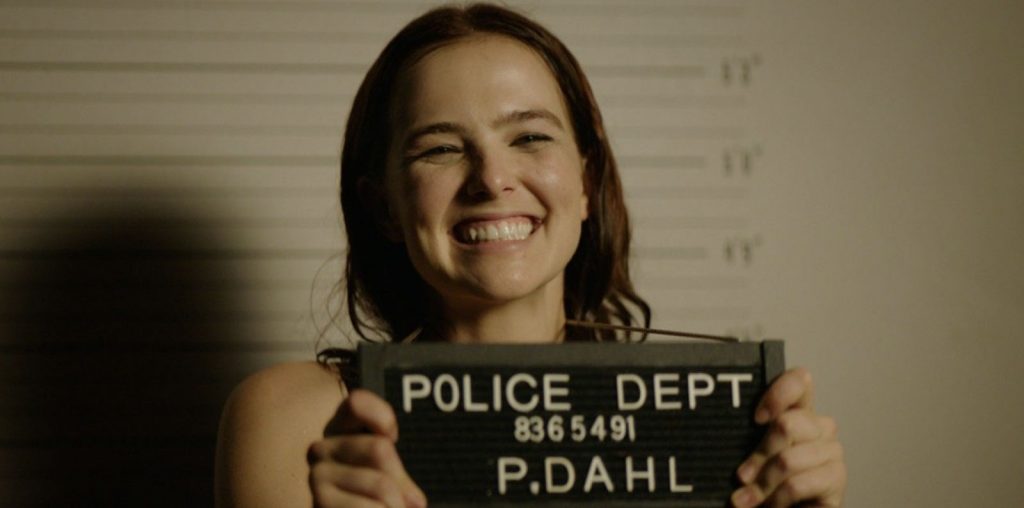
One of the most beautifully stark, yet provocative and powerful films of 2005 has to be “Capote”. Phillip Seymour Hoffman, who gives his finest screen performance to date, literally becomes Truman Capote through effete mannerism, nasaly voice & self-absorbed tone. Hoffman owns this biodrama, but director Bennett Miller, along with a stellar supporting cast, manage to keep up. Shot in monochromatic, nearly black and white starkness, the film has a subtle, raw power that builds to its stunning climactic sequence. And although the film drags a bit in the middle, it has a strong finish that leaves the audience with much to discuss. As of this writing, the film has garnered and won numerous award nominations, including a Golden Globe nomination for Best Actor in a Dramatic Film for Phillip Seymour Hoffman.
The film opens with the discovery of a murdered family of four, in the small town of Hokum, Kansas in 1959. Truman Capote (Phillip Seymour Hoffman) has risen to fame with the publication of his novella “Breakfast at Tiffany’s”, and he is the darling of New York society. After seeing a newspaper article on the murders, he becomes intrigued, and decides that this will be his next project. He enlists the help of long-time friend, Harper Lee (played by Catherine Keener in her most subtle role yet) and they head off to Kansas, so he can write an article for The New Yorker magazine. The town’s Sheriff, Alvin Dewey (Chris Cooper), and other town folk greet Capote with opposition & skepticism for his peculiar manner. But his companion Harper Lee, offsets his arrogance and outsider status with her small-town sensibility and sensitivity. Eventually the two win over the Sheriff and his wife, and even get one of the murdered girl’s friends to talk to them.
After being on the lam for several months, Perry Smith (Clifton Collins Jr.) and Richard Hickcock (Mark Pellegrino) are apprehended by Sheriff Dewey and soon sentenced to death. Finding himself increasingly involved in the story, Truman starts to personally interview the murderers being held in prison, particularly Perry Smith. Avoiding any discussion of the murders, Capote learns more about their lives of crime, which gives him the idea of extending his “New Yorker” article into a full-length novel. The novel would eventually be titled “In Cold Blood”, and would become the first of the non-fiction true crime genre novels ever written. Capote is clearly obsessed with Perry Smith, despite having lover Jack Denphy (Bruce Davidson) back in New York. He identifies so strongly with the wounded Perry, that he explains, “It’s as if Perry and I grew up in the same house. And one day he went out the back door and I went out the front.”. Capote clearly feels for these men, despite their being portrayed as murdering monsters. He even gets them a good lawyer, which leads to 4 long years of appeals, that at times threatens to consume him during the writing of his novel.
Dan Futterman’s screenplay portrays the tenderness of the relationship between Capote and Perry Smith without any overt controversy over their deep feelings for each other. Balanced with that, we see the ambitious and manipulative side of Capote, who is caught in a truly Faustian dilemma. He continuously lies to Perry, strings him along and ultimately probes him for the gruesome details of the actual murders, all so that he can finish his book. At the film’s climax, the final verdict is handed down that the murderers will indeed be sentenced to the death penalty. Capote is at once devastated and relieved, and the scene of him visiting the two men on the eve of their execution with tearful good-byes, drives home the intense emotions of his involvement in their story.
This film is a hauntingly arresting portrait of murder, humanity and the lengths one artist will go to for his art. It also should be sadly noted that after having “In Cold Blood” published, Truman Capote never wrote another book. The experience took a huge toll on him, and led him into a downward spiral of alcoholism and drug abuse, which ultimately shattered his once brilliant career.

I saw a press screening of this film recently, and was highly impressed by its moving account of the period in Truman Capote’s life during which he wrote ‘In Cold Blood’. The direction by the relatively unknown Bennett Miller is personal, evocative and affecting, but without being over-dramatic or saccharine. This is helped immensely by Philip Seymour Hoffmann’s incredible performance as Capote, as well as solid acting from Catherine Keener, Clifton Collins Jr., and Chris Cooper. Cooper plays K.B.I. Agent Alvin Dewey with perhaps a bit too much intensity, given his relatively small amount of screen time, but the portrayal nonetheless comes off as heart-felt.
The cinematography by Adam Kimmel is suitably gray and moody, with many evocative views of the flat Kansas plains, but most of the screen time is spent with the camera focused on Hoffmann – all of it time well spent.
While I haven’t read the biography by Gerald Clarke on which it’s based, the script seems to hit enough salient details to evoke Capote’s frame of mind, without inundating the audience with more than would fit in a feature-length film. I suppose one of my only complaints about the film would be that at times the conversations take on a sheen of Hollywood, saying things for dramatic impact that perhaps might not have been said in real life. But then again, I never met Capote, so who knows for sure.
All in all, this was a deeply engrossing film, and one I would highly recommend, especially if you’re a fan of Truman Capote.